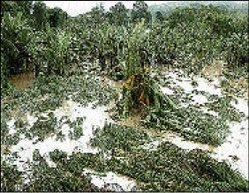Met Service flaws undermine Jamaica farm insurance - report
Published: Wednesday | August 12, 2009

Banana plantations are particularly vulnerable to hurricane-force winds. - File
The insurance company which received the World Bank contract to determine the feasibility of providing insurance for the island's agricultural sector is pointing to a number of weaknesses in an agency that will play a key role in making the policy workable.
In a pre-feasibility study it published more than a month ago, the contractors, CGM Gallagher, questioned the ability of the Jamaica Meteorological Service (JMS) to provide quality and timely data, especially for extreme weather conditions. The study outlines the need for the agency to improve on the weaknesses before it can implement a parametric policy.
It also perceives small-farming practices could pose a problematic application of the insurance policy, noting that it would be better applied to large farmers and commercial producers who mono-crop.
The policy is to utilise a parametric insurance model which does not indemnify total loss but rather pays out a sum to the insured when a natural disaster occurs, based on a pre-signed agreement. Such a policy is, therefore, good for high-intensity but low-frequency occurrences such as hurricanes and earthquakes.
Wind measurement
While the authors of the study have established that there is a real need for an insurance policy for the agricultural sector, it says important data such as records of wind measurements in tropical cyclones, for instance, which should be kept by local meteorological services, are nearly non-existent.
The report added that measurements which have been made by the meteorological service in recent years failed to capture the most intense parts of the storm.
The company said that while rainfall data collection is better compiled, true rainfall is not captured by traditional gauges - which the JMS uses - during the peak of a hurricane.
"An additional problem is the accessibility of manual rain measurement stations right after a major tropical cyclone or other rain event," CGM underscored.
"Thus, in many cases, several days can go by with no daily measurements of rainfall made at many stations, making data extrapolation very difficult. Gauges may also exceed capacity in some circumstances, leading to underrecording of total rain."
It said that while the meteorological service has sufficient and reliable basic equipment, the system needed to be strengthened to provide better spatial distribution measurements and more timely information.
CGM also questions whether the JMS was autonomous enough to play the required role, noting that its status as a government agency could pose a problem to clients and international reinsurance agencies that might not feel comfortable working with the agency without an independent third party verifying the data.
The insurers noted that general farming practices could present a problem to the practicability of the policy. It says the policy can be developed for large farmers and commercial producers who mono-crop, but it would prove a challenge to roll out a policy for small farmers.
Index insurance
About 76 per cent of the island's 220,000 farmers operate on a hectare or less of land.
"We believe that index insurance is extremely difficult to implement at the small subsistence, multi-cropping farmer level," the authors said. "In addition to the technical challenges of reducing basis risk to acceptable levels, there is an equal challenge in collecting premium from farmers when they don't have land title, don't have financing and don't pay any taxes."
The insurers suggested some of the farmers could be covered by loan defaults hedged by the Development Bank of Jamaica. The loans would be provided through index insurance with interest charged on a pro-rated basis to each loan holder.
gareth.manning@gleanerjm.com








